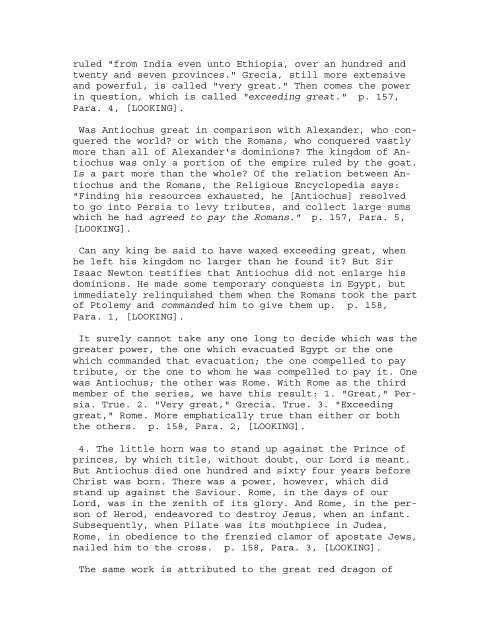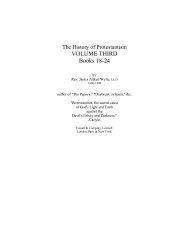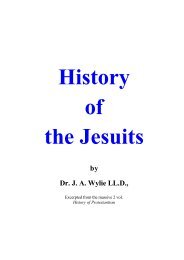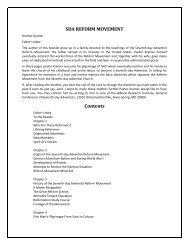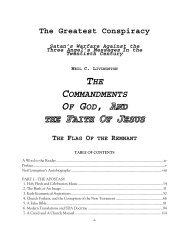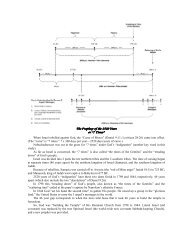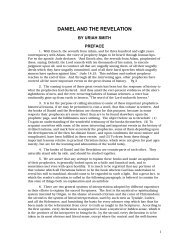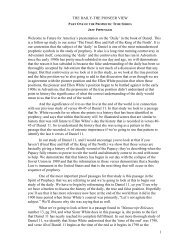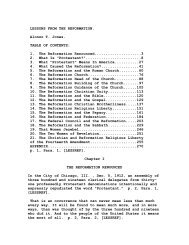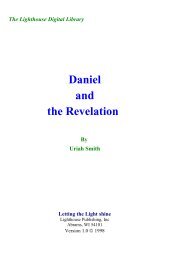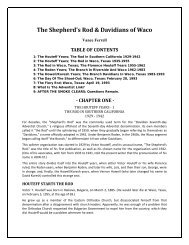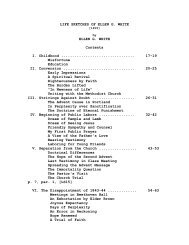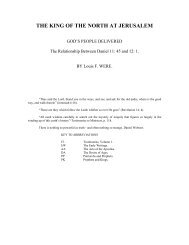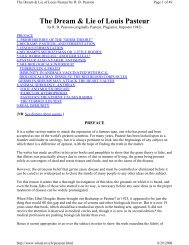LOOKING UNTO JESUS OR CHRIST IN TYPE AND ANTITYPE. BY ...
LOOKING UNTO JESUS OR CHRIST IN TYPE AND ANTITYPE. BY ...
LOOKING UNTO JESUS OR CHRIST IN TYPE AND ANTITYPE. BY ...
You also want an ePaper? Increase the reach of your titles
YUMPU automatically turns print PDFs into web optimized ePapers that Google loves.
uled "from India even unto Ethiopia, over an hundred and<br />
twenty and seven provinces." Grecia, still more extensive<br />
and powerful, is called "very great." Then comes the power<br />
in question, which is called "exceeding great." p. 157,<br />
Para. 4, [<strong>LOOK<strong>IN</strong>G</strong>].<br />
Was Antiochus great in comparison with Alexander, who conquered<br />
the world? or with the Romans, who conquered vastly<br />
more than all of Alexander's dominions? The kingdom of Antiochus<br />
was only a portion of the empire ruled by the goat.<br />
Is a part more than the whole? Of the relation between Antiochus<br />
and the Romans, the Religious Encyclopedia says:<br />
"Finding his resources exhausted, he [Antiochus] resolved<br />
to go into Persia to levy tributes, and collect large sums<br />
which he had agreed to pay the Romans." p. 157, Para. 5,<br />
[<strong>LOOK<strong>IN</strong>G</strong>].<br />
Can any king be said to have waxed exceeding great, when<br />
he left his kingdom no larger than he found it? But Sir<br />
Isaac Newton testifies that Antiochus did not enlarge his<br />
dominions. He made some temporary conquests in Egypt, but<br />
immediately relinquished them when the Romans took the part<br />
of Ptolemy and commanded him to give them up. p. 158,<br />
Para. 1, [<strong>LOOK<strong>IN</strong>G</strong>].<br />
It surely cannot take any one long to decide which was the<br />
greater power, the one which evacuated Egypt or the one<br />
which commanded that evacuation; the one compelled to pay<br />
tribute, or the one to whom he was compelled to pay it. One<br />
was Antiochus; the other was Rome. With Rome as the third<br />
member of the series, we have this result: 1. "Great," Persia.<br />
True. 2. "Very great," Grecia. True. 3. "Exceeding<br />
great," Rome. More emphatically true than either or both<br />
the others. p. 158, Para. 2, [<strong>LOOK<strong>IN</strong>G</strong>].<br />
4. The little horn was to stand up against the Prince of<br />
princes, by which title, without doubt, our Lord is meant.<br />
But Antiochus died one hundred and sixty four years before<br />
Christ was born. There was a power, however, which did<br />
stand up against the Saviour. Rome, in the days of our<br />
Lord, was in the zenith of its glory. And Rome, in the person<br />
of Herod, endeavored to destroy Jesus, when an infant.<br />
Subsequently, when Pilate was its mouthpiece in Judea,<br />
Rome, in obedience to the frenzied clamor of apostate Jews,<br />
nailed him to the cross. p. 158, Para. 3, [<strong>LOOK<strong>IN</strong>G</strong>].<br />
The same work is attributed to the great red dragon of


